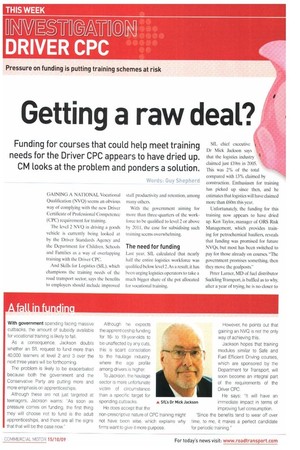With government spending facing massive cutbacks, the amount of subsidy available for vocational training is likely to fall.
Page 18

Page 19

If you've noticed an error in this article please click here to report it so we can fix it.
As a consequence, Jackson doubts whether an Sit request to fund more than 40,000 learners at level 2 and 3 over the next three years will be forthcoming.
The problem is likely to be exacerbated because both the government and the Conservative Party are putting more and more emphasis on apprenticeships.
Although these are not just targeted at teenagers, Jackson warns: "As soon as pressure comes on funding, the first thing they will choose not to fund is the adult apprenticeships, and there are all the signs that that will be the case now." Although he expects the apprenticeship funding for 16to 19-year-olds to be unaffected by any cuts, this is scant consolation to the haulage industry, where the age profile among drivers is higher.
To Jackson, the haulage sector is more unfortunate victim of circumstance than a specific target for spending cutbacks.
He does accept that the non-prescriptive nature of CPC training might not have been wise, which explains why firms want to give it more purpose. However, he points out that gaining an NVQ is not the only way of achieving this.
Jackson hopes that training modules similar to Safe and Fuel Efficient Driving courses, which are sponsored by the Department for Transport, will soon become an integral part of the requirements of the Driver CPC.
He says: "It will have an immediate impact in terms of improving fuel consumption.
"Since the benefits tend to wear off over time, to me, it makes a perfect candidate for periodic training." setting up a subsidised NVQ course through ORS. "The NV0 could have given some purpose to the CPC for everyone, but it seems to have been made more complicated for drivers."
Jackson concedes it's ironic that just as the logistics sector seems to have woken up to the value of training, accessing public funding for it has become difficult.
He partly blames a relaxation of restrictions on training grants earlier this year by the Learning and Skills Councils (LSCs), which administers funding. The surge in applications that ensued meant funding for new training courses had to be frozen until April 2010 because the money ran out.
Taylor says this is little consolation to operators such as Suckling. "With CPC, they want to he doing one day's training a year, and to be able to plan it. They don't want to hear that maybe they'll get funding or maybe they won't."
Chris Adair, operations manager at County Durham-based Baltic Training Services, points out Stl, has had at least two years to prepare for the Driver CPC, which came into force on 10 September. He says: -You would have thought somebody would have said 'why don't we let NVQs form part of it?' Nobody has raised that question."
Primary objective
But Jackson responds that the 35 hours of training drivers need to complete over five years for the CPC is mandatory. "There is no public funding for mandatory training; that's always been the government's immoveable position with mainstream funding."
However, he says SfL has managed to make the training that underpins the knowledge needed for the NVQ in driving a goods vehicle eligible for funding, provided the primary objective is gaining the NVQ, rather than complying with CPC requirements.
He reveals: "My stance is that we need to maximise the quality of training in the sector because it hasn't been brilliant. What we've achieved is the bringing together of discretionary training and mandatory training as much as we can."
Despite the fact that a course that underpins the NVQ programme is. fundable, that doesn't mean that it will be. ['here's a distinction." Jackson states. "The degree to which the course is funded is [dependent 0111 the amount of public funding around and the relative state of each regional LSC."
Cost of courses To obtain such funding, providers must be approved by SfL as well as the local [SC. One such provider is Warwickshire and Hinckley College, which has launched a series of seven-hour modules covering subjects such as "eco-efficient" driving, safe loading and unloading and drivers' hours rules. It costs £99 per person for each module, compared with the £900 it costs for the unsubsidised ORS NVQ course on driving a goods vehicle, which covers two days' training and one day's on-the-job assessment. •












































































































































